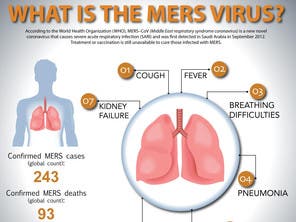MERS is a viral respiratory infection. The first known MERS patient died of severe respiratory illness in 2012 in Jeddah, Saudi Arabia. About 10% of reported cases so far have resulted in fatalities.

Most cases have been in the Middle East, but a few people have been diagnosed elsewhere. South Korea is the largest outbreak in the world outside of Saudi Arabia, where most of the 1,100 plus cases have been.
It is caused by a coronavirus, which is from the same virus family as the common cold and SARS, which first appeared in southern China in 2002.
How do I catch it and what are the symptoms?
Transmission is through close contact with infected people - from living with or caring for someone, for instance - but camels are also thought to spread the virus: hence the quarantine of camels at South Korean zoos.
Although MERS can infect through touch and blood, it appears to mainly infect those who breathe in large amounts of virus.
The symptoms are fever, cough and shortness of breath, with an average incubation period of 5 to 6 days.
Some people also get gastrointestinal symptoms including diarrhea and nausea/vomiting. For many people with MERS, more severe complications can follow, such as kidney failure and pneumonia.
How many people have died?
More than 40 cases have been recorded in South Korea, four of which resulted in fatalities.
Most of the people who died had an underlying medical condition. Some infected people had mild symptoms (such as cold-like symptoms) or no symptoms at all; they recovered.
"Further cases can be expected," the U.N. health agency said. It announced Friday that an agency team of experts will visit South Korea to review the fight against the disease.
Where have cases been recorded?
Most reported cases have been linked to countries in and near the Arabian Peninsula. Countries with lab-confirmed cases of MERS include Saudi Arabia, United Arab Emirates (UAE), Qatar, Oman, Jordan, Kuwait, Yemen, Lebanon and Iran.
However, theEuropean Centre for Disease and Control said there had been 12 cases of MERS travelling to Europe.
The number of cases and deaths have been broken down as follows:
Europe:
UK: 4 cases/3 deaths
Germany: 2 cases/1 death
France: 2 cases/1 death
Italy: 1 case/0 deaths
Greece: 1 case/0 deaths
Netherlands: 2 cases/0 deaths
Africa has seen three cases and one death, Asia two cases and one death and the US two cases and no deaths.
The most recent European cases were reported by Greece (1 case reported to WHO in April 2014) and by the Netherlands (2 cases in May 2014)
Could it become a deadly pandemic?
There is no vaccine for MERS and about 10% of reported cases so far have resulted in fatalities. Officials maintain that there are far more reasons for calm caution, than for panic.
No comments:
Post a Comment